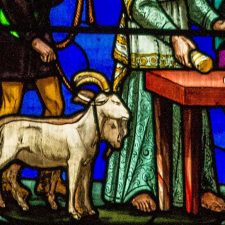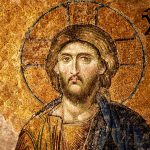Where is the wise man? Where is the scribe? Where is the debater of this age? Has not God made foolish the wisdom of the world? For since in the wisdom of God the world through its wisdom did not come to know God, God was well-pleased through the foolishness of the message preached to save those who believe. For indeed Jews ask for signs and Greeks search for wisdom; but we preach Christ crucified, to Jews a stumbling block and to Gentiles foolishness, but to those who are the called, both Jews and Greeks, Christ the power of God and the wisdom of God. Because the foolishness of God is wiser than men, and the weakness [asthenos – without strength, powerless] of God is stronger than men. (1 Corinthians 1:20-25)
In the above passage, Paul tries to get the Corinthians to understand that the avenue to comprehending the highest priorities of God does not take one through the wisdom of the world. In fact, he says that salvation has been removed from the plane of man’s ability to think on his own and instead established on the foundation of faith in something or someone outside himself (verse 21). In verse 22, “but we preach Christ crucified,” that it was His life crucified as an offering that should be the object of that faith. The emphasis is on plan of the Father executed by the Son on behalf of those, both Jews and Greeks, who would place their confidence in the fulfillment of that plan by a crucified Christ. Man’s ability or efforts are not part of the equation. In fact, “God has chosen the weak things of the world to shame the things which are strong (verse 27).
Despised and Forsaken
For He grew up before Him like a tender shoot, and like a root out of parched ground; He has no stately form or majesty that we should look upon Him, nor appearance that we should be attracted to Him. He was despised and forsaken of men, a man of sorrows and acquainted with grief; and like one from whom men hide their face He was despised, and we did not esteem Him. Surely our griefs He Himself bore, and our sorrows He carried; yet we ourselves esteemed Him stricken, Smitten of God, and afflicted. But He was pierced through for our transgressions, He was crushed for our iniquities; the chastening for our well-being fell upon Him, and by His scourging we are healed. All of us like sheep have gone astray, each of us has turned to his own way; but the Lord has caused the iniquity of us all to fall on Him. He was oppressed and He was afflicted, yet He did not open His mouth; like a lamb that is led to slaughter, and like a sheep that is silent before its shearers, so, He did not open His mouth. (Isaiah 53:2-7)
Although the Old Testament predicted a coming Messiah who would rule as a king with full authority, there are also numerous passages, particularly from Isaiah, that characterize another coming of Messiah as a suffering servant. The most recognizable of these is found in the above passage and illustrates the weakness of the Messiah at His first coming, as a lamb led to the slaughter. He was rejected by His people (John 1:11), “He was despised, and we did not esteem Him”, “yet we ourselves esteemed Him stricken, Smitten of God, and afflicted”. He accepted the divine judgement from His Father, including physical beatings, as a substitute for each one of us. In addition, He chose to stay quiet in spite of the false claims against Him. He demonstrated complete weakness.
A Bondservant
The Apostle Paul characterizes this weakness in Philippians 2 as emptying Himself of His deity in order to accept the role as a bondservant (doulos – a slave, one who is in a permanent relation of servitude to another, his will being altogether consumed in the will of the other – Zhodiates). It demonstrated a humility that Paul recognized as a necessary mindset to experience the fullness of God (verse 3-5). In verse 9, “For this reason also, God highly exalted Him, and bestowed on Him the name, which is above every name”. The greatness of the work of Jesus Christ at His first coming is characterized by His willing weakness to accept the perfect plan of the Father on behalf of the world.
“And when I came to you, brethren, I did not come with superiority of speech or of wisdom, proclaiming to you the testimony of God. For I determined to know nothing among you except Jesus Christ, and Him crucified. I was with you in weakness and in fear and in much trembling, and my message and my preaching were not in persuasive words of wisdom, but in demonstration of the Spirit and of power, so that your faith would not rest on the wisdom of men, but on the power of God.” (1 Corinthians 2:1-5)
The Gospel
Paul, the five-star general of the New Testament age, gives us insight into how each one of us can connect to this weakness in the above passage. He recognized that his ability to have an effective ministry was to manifest the power of the Holy Spirit and that would only take place in weakness. In this way, “my message and my preaching were not in persuasive words of wisdom, but in demonstration of the Spirit and of power, so that your faith would not rest on the wisdom of men, but on the power of God”. The source of that weakness can be found in verse 2, where he makes a determination, a judicial judgment that the weakness of Christ (Christ crucified) and the message of the gospel, that He had accomplished full redemption (John 19:30) for everyone and can be received on the basis of faith alone.
Moses acknowledged his weakness before God in Exodus 4 when he testified that, “Please, Lord, I have never been eloquent, neither recently nor in time past, nor since You have spoken to Your servant; for I am slow of speech and slow of tongue” (verse 10). How would he be God’s spokesman before Pharaoh with such a weakness. The Lord’s answer was that Moses’ weakness would be God’s Avenue to allow Him to do the speaking. In verse 12, “Now then go, and I, even I, will be with your mouth, and teach you what you are to say.” In fact. The Lord had earlier illustrated how that would take place in verses 1-5:
Then Moses said, “What if they will not believe me or listen to what I say? For they may say, ‘The Lord has not appeared to you.'” The Lord said to him, “What is that in your hand?” And he said, “A staff.” Then He said, “Throw it on the ground.” So, he threw it on the ground, and it became a serpent; and Moses fled from it. But the Lord said to Moses, “Stretch out your hand and grasp it by its tail” — so he stretched out his hand and caught it, and it became a staff in his hand — “that they may believe that the Lord, the God of their fathers, the God of Abraham, the God of Isaac, and the God of Jacob, has appeared to you.”
Wait for the Lord
The fact is that the Lord is more than capable of managing His plan. In Acts 5, the Christian leaders were commanded not to proselytize, but they did. Complaints were brought to the Jewish leadership that action needed to be taken. Gamaliel, a highly respected teacher of the Law testified that it was not necessary to take any action since “if it is of God, you will not be able to overthrow them; or else you may even be found fighting against God” verse 39). He also cited a false teacher named Theudas who had four hundred followers, yet when Theudas was killed, the movement died on its own.
Do you not know? Have you not heard? The Everlasting God, the Lord, the Creator of the ends of the earth does not become weary or tired. His understanding is inscrutable. He gives strength to the weary, and to him who lacks might He increases power. Though youths grow weary and tired, and vigorous young men stumble badly, Yet those who wait for the Lord will gain new strength; they will mount up with wings like eagles, they will run and not get tired, they will walk and not become weary. (Isaiah 40:28-31)
Success in serving God is not dependent on natural or acquired ability, but rather it is the willingness to wait on God. The manifestation of God’s weakness is clearly seen in man’s willingness to be weak so that God can be strong in us (2 Corinthians 12:9-10). He is aware of the need and is able to meet the need in His timing and manner. It represents the simple life.
The Simpleton & the Sophisticate
Rabbi Nachman of Breslov, the famous 18th-century Ukrainian teacher, shared many stories as a form of teaching biblical concepts. One of his more famous tales is called “The Simpleton and the Sophisticate.” The story compares the lives of two different men – one simple and one sophisticated.
The simple man doesn’t have much and isn’t one of the best in his trade. Yet, he is always happy and satisfied with what he has. He is honest and straight as an arrow in all his dealings with others. He is also confident and peaceful with who he is and has no need to pretend to be anyone or anything different.
The sophisticated man on the other hand is knowledgeable, well-traveled, and worldly. He excels in many areas and is clever about how to make more money and do things better. Yet, he is never satisfied with himself or with what he has. He has this nagging feeling that he should be more and have more. Ultimately, his depression and sense of failure leads to a bitter life. Conversely, the simple man rises to prominence on account of his reliability and reputation for integrity.
The moral of the story? The simple life is the best life.













